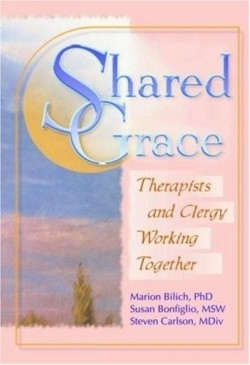Shared Grace
Therapists and Clergy Working Together
Rarely has the story of those with Dissociative Identity Disorder (DID) or Multiple Personality Disorder (MPD) been presented with such compassion and clarity. Three professionals—a Jewish psychologist, Bilich, a Christian minister, Carlson and a social worker, Bonfiglio—collaborate to help bring healing to Teresa, a severely abused young woman with dissociative identity disorder, thus the title Shared Grace.
“Teresa is a thirty-five-year old divorced woman who works as a nurse in a local community hospital. She is a recovering alcohol and cocaine addict, heavily involved in a twelve-step program.” The story begins after Bilich has been seeing Teresa for some years. Slowly her life began to unfold during therapy. “As she came to trust Marion (Bilich) more, Teresa began to reveal a history of repeated violent and sadistic acts of abuse during her childhood. From her earliest memories she had been brutally physically, emotionally, and sexually abused and terrorized, first by her mother, and later by an uncle and his son.”
Bilich, Carlson and Bonfiglio developed the “Benevolence Model” which enable them to work toward the common goal of integration and health for Teresa. This Benevolence Model is characterized by healing images of God and develops around six principles: God is love, God loves us, God’s love is unconditional, God’s forgiveness is always available to us, we are called to love God, ourselves and others and that we were created to be in relationship with each other. They worked with a set of basic assumptions about therapy that included an emphasis on healing rather than cure, healing being a process, stressing the importance of relationship in the healing process, stressing the importance of love in the healing relationship, some degree of mutuality being present in a successful therapy relationship and the importance of the spiritual dimension in the healing process.
The definition of terms and assumptions is written in language that both therapists and ministers can understand. All those in a relationship with a multiple personality disorder person will find this book essential to their education and understanding. The resource sections included in the various appendices are so complete and varied that they are as valuable as the book itself.
Reviewed by
Linda Wilson
Disclosure: This article is not an endorsement, but a review. The publisher of this book provided free copies of the book to have their book reviewed by a professional reviewer. No fee was paid by the publisher for this review. Foreword Reviews only recommends books that we love. Foreword Magazine, Inc. is disclosing this in accordance with the Federal Trade Commission’s 16 CFR, Part 255.

